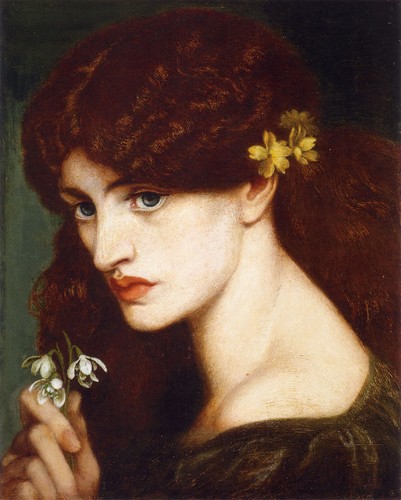
We know the end of this relationship because one of the partie explained it. In 1884 Mahler was conductor of the Kassel opera house and fell in love with one of the singers, Johanna Richter. Apparently their time together was short but intense, and they split up during New Year's Eve 1885. The next day, the composer wrote to his friend Friedrich Löhr:
We're listening to the last song cycle, Die zwei blauen Augen (The two blue eyes). Those blue eyes made the poet to fell in love and now prompt him to leave home because she marries another man. The cycle deals with the pain of the poet and his wanderings around the world make us think of Winterreise, of course. This Lied is strongly linked to Schubert's work: a linden tree. Both Schubert and Mahler's wayfarers leave their home at night without saying farewell to anyone, and both find a linden on his way. However in Mahler's song it's early summer, the tree blossoms. Schubert's wayfarer ignores the tree calling him and passes by; the one of Mahler stops and sleeps under it, feeling then more comforted; as last week song, Rastlose Liebe, the poet accepts that Lieb und Leiden, love and suffering, go always together.
Die zwei blauen Augen is a great song that we're listening in a essential version, that of Dietrich Fischer-Dieskau and the Philharmonia Orchestra of London conducted by Wilhelm Furtwängler. The recording is from 1952, meaning that Fischer-Dieskau was twenty-seven; it's impressive how he sang at that age! Just one thing before listening to Die zwei blauen Augen: if you know the first symphony by Mahler you'll clearly identified in this song the funeral march of the third movement; as we have seen with various examples like Ablösung im Sommer and the third movement of the third symphonie or Des Antonius von Padua Fischpredigt, also in the third movement of the second symphonie, there is a close relationship between the symphonies of Mahler and his Wunderhorn Lieder (and this cycle is considered Wunderhorn because of its character).
Now I leave you with this wonderful performance of Die zwei blauen Augen. Enjoy!
Die zwei blauen Augen von meinem Schatz,
Die haben mich in die weite Welt geschickt.
Da mußt ich Abschied nehmen vom allerliebsten Platz!
O Augen blau, warum habt ihr mich angeblickt?
Nun hab' ich ewig Leid und Grämen.
Ich bin ausgegangen in stiller Nacht
Wohl über die dunkle Heide.
Hat mir niemand Ade gesagt.
Ade! Mein Gesell' war Lieb' und Leide!
Auf der Straße steht ein Lindenbaum,
Da hab' ich zum ersten Mal im Schlaf geruht!
Unter dem Lindenbaum,
Der hat seine Blüten über mich geschneit,
Da wußt' ich nicht, wie das Leben tut,
War alles, alles wieder gut!
Alles! Alles, Lieb und Leid
Und Welt und Traum!
The two blue eyes of my darling -
they have sent me into the wide world.
I had to take my leave of this well-beloved place!
O blue eyes, why did you gaze on me?
Now I will have eternal sorrow and grief.
I went out into the quiet night
well across the dark heath.
To me no one bade farewell.
Farewell! My companions are love and sorrow!
On the road there stands a linden tree,
and there for the first time I found rest in sleep!
Under the linden tree
that snowed its blossoms onto me -
I did not know how life went on,
and all was well again!
All! All, love and sorrow.













Comments powered by CComment